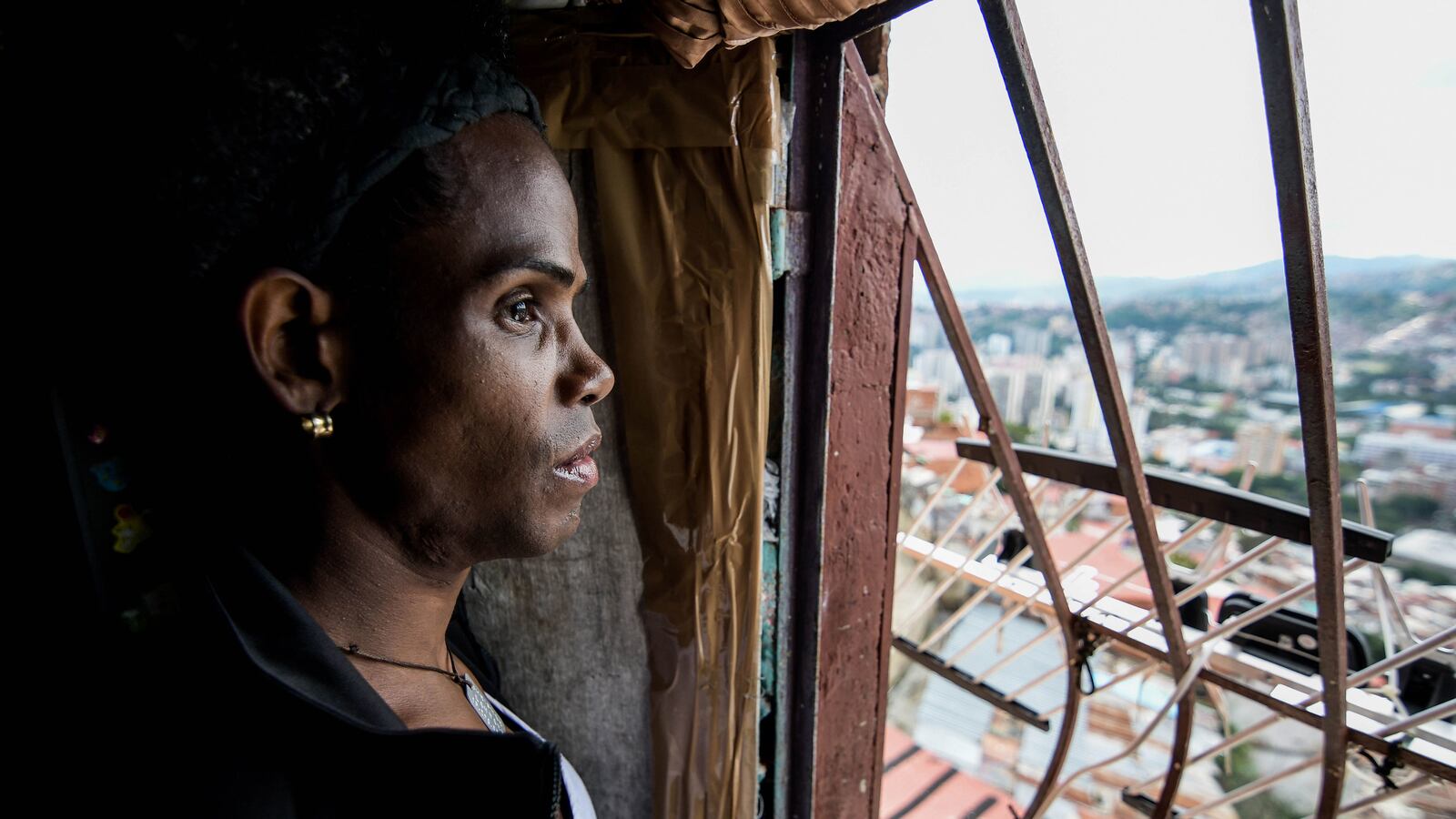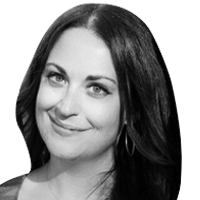CARACAS—“This is home, and I try to make it beautiful, no matter how others see it. Like I do with me, I guess.”
Chrismar rents a small, one-room apartment in 23 de Enero, one of Caracas’ many no-go neighborhoods, where authorities dare not enter. Call it an apartment is an overstatement—it’s more like a metal shed, placed atop others like it, unprotected from the relentless heat. Chrismar has painted the walls, as best she can, with turquoise paint she found in an alley nearby. It’s patchy, but she likes it, and where the patches got too big she has put pictures and postcards from places she will likely never see.
The poverty and suffering in Venezuela take your breath away. Basic necessities lacking for everyone, and society has lost its structure, relying on paramilitary groups to police and extort the most impoverished and vulnerable.
This neighborhood, 23 de Enero, is ruled by the colectivos, a criminal gang once armed and funded by the late Hugo Chávez to function as a secondary level of societal control, and nothing is said or done here without the colectivos’ say-so. Most of those who live here no longer register the lawlessness and suffering. It is an everyday reality, a function of the country they call home. Whatever the outcome of the intensifying showdown at the top of the Venezuelan power structure, life here is not likely to change any time soon.

Chrismar has been here for years, ever since she got herself together, so this is a place of new beginnings for her, despite the old décor.
She was just a baby when her mother, unable to care for her newborn, handed Chrismar off to a friend. That lasted for five years, until the friend fell on hard times and handed her back. For Chrismar, that was the beginning of the troubles, or at least the first she could clearly remember.
“I always knew I was a girl, but at six, I also wanted to express it. I felt different, broken in two, and I could clearly formulate the thought that I wanted to grow up and be a woman.”
It was that year that her mother first caught her playing with dolls and dressing up in women’s clothing. Chrismar was so badly beaten that her skin broke and her shoulder dislocated. It has not fully healed to this day.
“I never knew my father, and from that day on I wished I had never known my mother. She despised me, was repulsed by me, and she tried her best to beat the differences out of me.”
Chrismar could only take the beatings for a year, then she ran away and started living on the streets, begging for food and sleeping under bridges. After about a year she was rescued by the Instituto Nacional de Ayuda al Menor, Venezuela’s institute for minors, where she was able to get some stability, some schooling, until she aged out at 13. At that point she had to choose between a shelter or a return to the mother who had beaten her raw. She chose the latter, but regretted it almost instantly.

“The beatings got worse now that I was older, as if she thought I could take more as an almost adult. I couldn’t, so I left.”
A scruffy white-and-black dog runs into the shack and jumps up on Chrismar’s lap, and the otherwise hardened woman goes soft, in an instant. I watch them sitting there on the apricot bedspread and I feel thankful for the interruption, allowing us both a break in the recounting of this story.
“Her name is Esperanza,” Chrismar tells me. I know enough to know that it means hope, and I have seen enough to know that very little of it fits within these walls.
The shelter was like a prison without guards, with many who were ready to take advantage of the vulnerable and broken. Now 16 years old, Chrismar was beginning to be interested in boys, and thought she had found new hope when one of the male staff members showed her some much needed attention. After a few weeks of what she thought was courtship, the staff member cornered her in the hallway and pushed her into a storage room.
“He raped me and no one cared. I tried telling the director but he, like so many others, was filled with hatred toward people like me. No one would hear me, no one would listen.”
So Chrismar went back to the streets, where she at least felt like she had some small amount of control. There, she made friends, seven other trans women who had similar stories and similar scars; together they formed their own kind of family. The years on the streets were dark, she tells me, even with the forming of bonds and friendships among the outcasts of Caracas. Now a crack addict, Chrismar sold the only things she had and, just as often, found it taken from her by those she was supposed to be able to trust.

“One night, I was raped by two policemen, not very far from here. I felt empty, but not shocked or even angry, at the time. Everyone used me; saw me as nothing, or even less. So why would I be shocked when they treat me like less of a human?”
A few months after the rape, she heard that one of the policemen had been killed, crossing the street. Chrismar shrugs as she tells me, and even slips me a dry smile. “That’s karma, I guess,” she says, while Esperanza playfully bites at her finger.
I ask Chrismar if I can meet some of her friends, and so she brings me to the nearby river. That’s where many of them live, the transgender men and women of Caracas. Shunned by society, they have made their home here, where no one else will go, and they do their best to comfort and protect each other from a world that has showed them very little protection and comfort.
Here I meet Monica Ceballos, homeless since age nine and a prostitute for survival for almost as long. Monica was thrown out by her mother when she started showing signs of being different, and now she bathes here in the dirty river, preparing herself for another night of work.
Alondra stands off to the side, doing her makeup in a cracked mirror while she trades jabs with Monica about who has the best boobs. Both of them have had oil injected into their chest—a cheap version of a breast augmentation—and while it may not look perfect it helps them feel and appear more like the women they are. Vanity is a luxury here but women will be women, even under these bridges, so these sisters of choice do their best to make themselves and each other feel beautiful.

When she was 17, Chrismar was diagnosed with HIV, and the remaining pieces of her life completely shattered. Angry at the world that had rejected her, the people who had used and abused her, she willfully had unprotected sex with her clients to punish everyone and everything, including herself.
“It was my darkest days, I wanted to die, yet I didn’t. I wanted everyone else to feel the pain I felt. I had nothing. No—I started with nothing and even that was somehow taken from me”.
She continued that life until she collapsed from HIV and was hospitalized with a severe respiratory infection. Ironically, this ended up being the best thing to happen to her in her life. While in hospital, she met good people for perhaps the first time, people who wanted to help and didn’t ask for anything in return or used her vulnerability to take advantage.
She received some treatment but in Venezuela, even the most basic medicine, such as antibiotics or painkillers, are almost impossible to come by and HIV drugs are accessible only for those who have unlimited funds or are able to smuggle them in via Miami or Colombia.
The Venezuelan crisis, now going on 21 years, has made everyone a victim, but people like Chrismar are twice victimized and furthest down on the societal scale. Even so, she found her purpose by joining the NGO Solidarity Action (Acción Solidaria), helping patients with HIV. They had helped her when she had less than nothing, and that one act of kindness inspired Chrismar to start giving back.
Today, Chrismar works as a cleaning lady, trying to rebuild herself and find a life among the rubble. There is less anger in her now, she says, mainly because she feels less anger from others.
“My dream now is to one day have breast surgery, to be able to really feel like a woman one time before I die.”
Unable to come by antiretrovirals and most days, even food, Chrismar knows her life will be cut short and her health is slowly deteriorating; but still, she is happier now than ever. She has purpose, and even real friends like Monica, Alondra and her colleagues at Acción Solidaria.
When I leave the ladies, they’re doing each other’s makeup and cooking up some rice on the hot plate on the ground. They’re preparing for the evening and chattering away like girlfriends do anywhere; commenting on clothes and making inside jokes within earshot of a curious stranger.
Chrismar is almost 40 now and she tells me she finally has peace. Hers is not a unique story here in Caracas and she refuses to serve as an example to anyone, be it for good or bad.
“I’m clean now, and I’m not afraid anymore, not like I was. The things I want now are what anyone wants. I want to be accepted. Just the way I am.”

